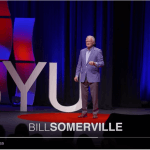The Purposeful For-Profits
by: James Higa, Executive Director
I recently witnessed a tectonic shift in the making, which could lead to massive social impact. YCombinator (YC) is Silicon Valley’s best known and most influential incubator. Companies that are household names like Airbnb and Dropbox had their start in YC. YC has undoubtedly challenged the way we think about how startups are launched and funded. At their most recent Demo Day, I was challenged to think about nonprofits in a different light.
YC broke down a wall and started accepting nonprofits into their hyper competitive program. I have to give YC props – they’ve stuck to their commitment to support nonprofits. Every Demo Day, the number and quality of these nonprofits have increased.

At this Winter’s Demo Day, co-founders Rose Afriyie and Genevieve Nielsen of mrelief pitched a screener for Food Stamp eligibility so that people in the Southside of Chicago don’t have to wait up to 7 hours for services they may not even qualify for. It was doubly heartening for me to see that mrelief is building on top of the Ohana open source directory of services – a tech solution that PVF funded – that was developed by San Mateo County and Code for America.
In addition to these nonprofits, what struck me was the emergence of a new breed of purposeful for-profit companies that want to have social impact.
WorldCover, is a for-profit company that aspires to provide the 90% of smallholder farmers around the world with access to crop insurance. In countries like Ghana, there is no social safety net. Every farmer is one natural disaster away from ruin. When there is drought, small maize farmers there lose more than just their income; they also lose the ability to pay school fees for their children and feed their families. WorldCover provides a transformative safety net using satellites to monitor the rainfall and trigger payouts automatically.
I’ve gotten to know the founders Chris Sheehan and Shiliang Tang, who are building WorldCover to show that (1) finance can be used as a tool for good in the world, and (2) a business can have positive social impact, sustain itself, and not have to be dependent on hat in hand philanthropic donations year after year. I think WorldCover has the potential to touch millions of farmers around the world and change their lives. This is impact on the biggest scale.
Maybe it’s time for us to begin breaking down the walls in the ways we think about nonprofit or for-profit.
Also at Demo Day I spoke with Copia’s CEO, Komal Ahmad, and heard her story of inviting a homeless vet to lunch near the UC Berkeley campus and seeing the irony of Berkeley’s dining hall just across the street throwing away thousands of pounds of food. This compelled her to start for-profit company, Copia. Corporations around the Bay Area like Google can request a food pickup via Copia, and the surplus food is matched to nearby shelters, food pantries, low-income housing or organizations. Their technology enables these corporations to receive a tax write-off and a reduction in the disposal costs for providing meals to communities in need.
During Super Bowl 50 weekend alone, Copia recovered over 28,000 pounds of gourmet food from events and venues throughout the Bay Area and delivered food to 14 different non-profits who provide over 23,000 meals to people who need it. Copia’s revenue comes from a percentage of the tax savings they proactively save for Silicon Valley companies. Think about the size of the impact they can have if they go national.
If that weren’t enough, in this batch of companies there was also Outschool, a marketplace for classes and field trips for kids, and Landed, which is bringing fresh thinking to the problem of affordable housing by helping teachers raise debt-free down payments for their home purchases by tapping into the community power of their school, parents, alumni, executives, and institutions.

In addition to many more YC companies along these lines, I see a stream of social entrepreneurs emerging from our campuses. There are more and more accelerators like Fast Forward and Tumml where promising companies are being incubated as we speak. Unfortunately, most of these companies find it difficult to raise capital. Traditional venture capitalists see them as too small to matter, and traditional foundations can’t make investments in for-profit companies.
Maybe it’s time for us to begin breaking down the walls in the ways we think about nonprofit or for-profit. Maybe these are not the right categories, boxes, or frameworks to use. Maybe we ought to be looking at the actual scale of impact and changes organizations can power and not whether they are nonprofit, a tech nonprofit, or for-profit. What if a philanthropic fund to invest in all of these great purposeful for-profits could be created?
PVF has always aspired to be a demonstration foundation of what philanthropy could be. In this spirit, we will continue to ask the questions that pushes all of us to boldly go where philanthropy has not gone before. Are there any adventurous and bold donors out there who are ready and willing to think out of the box to support innovative startups like these that are redefining the labels ‘for-profit’ and ‘non-profit’?





